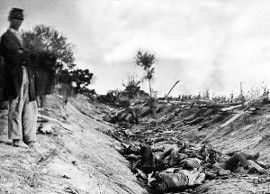The Emancipation Proclamation: “… all the moral grandeur of a bill of lading”
Posted September 17th, 2012 by Katrina BrowneCategory: Public History Tags: Abraham Lincoln, Battle of Antietam, Battle of Sharpsburg, Emancipation Proclamation, Sesquicentennial of the U.S. Civil War
 A week ago I was still pronouncing “Antietam” as if it rhymed with “Vietnam.” Now I know it’s pronounced “Anteetum” … and so much more. My husband John and I had heard about the 150th anniversary commemorations of the Battle of Antietam/Battle of Sharpsburg, and since we’d been meaning to have a camping get-away, we decided that this was a great excuse to get outdoors and pursue my work goal of seeing how the 150th of the Civil War, and the role of slavery in the war’s causes and consequences, is being acknowledged at battlefields.
A week ago I was still pronouncing “Antietam” as if it rhymed with “Vietnam.” Now I know it’s pronounced “Anteetum” … and so much more. My husband John and I had heard about the 150th anniversary commemorations of the Battle of Antietam/Battle of Sharpsburg, and since we’d been meaning to have a camping get-away, we decided that this was a great excuse to get outdoors and pursue my work goal of seeing how the 150th of the Civil War, and the role of slavery in the war’s causes and consequences, is being acknowledged at battlefields.
Wow.



